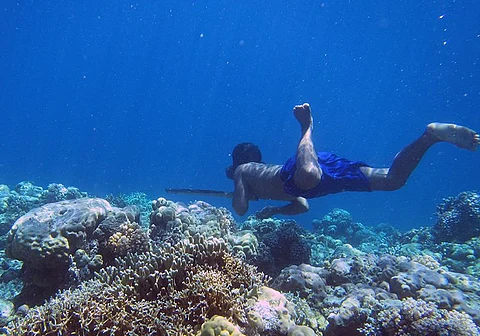THURSDAY, April 19, 2018 (HealthDay News) -- For members of an Indonesian group known as the Bajau, the ability to dive deeply for long periods of time appears to be in their genes.
Specifically, new research suggests their extraordinary breath-holding abilities may be due to genetically enlarged spleens.
For over 1,000 years, the Bajau people have traveled the Southeast Asian seas in houseboats and collected food by free-diving with spears.
The Bajau are famous for their extraordinary breath-holding abilities. Some members can dive up to 70 meters (230 feet) with nothing more than a set of weights and a pair of wooden goggles, the scientists said.
How? It's believed that the spleen plays an important role in enabling humans to free-dive for extended lengths of time.
"There's not a lot of information out there about human spleens in terms of physiology and genetics, but we know that deep-diving seals, like the Weddell seal, have disproportionately large spleens," said study first author Melissa Ilardo, from the University of Cambridge in England.
When people free-dive, the spleen contracts and ejects oxygenated red blood cells into the bloodstream. This has been found to provide up to a 9 percent increase in oxygen, enabling longer dive times, the researchers explained.
"I thought that if [natural] selection acted on the seals to give them larger spleens, it could potentially do the same in humans," Ilardo added in a university news release.
In the study, she spent several months in Jaya Bakti, Indonesia, taking genetic samples and performing ultrasound scans of the spleens from both the Bajau and their land-dwelling neighbors, the Saluan.
The results showed the Bajau have a median spleen size that is 50 percent larger than the Saluan.
So, the international team of scientists began to investigate the Bajau's genetic data. The researchers discovered that members of the Bajau have a gene called PDE10A, which the Saluan do not. It is thought that the PDE10A gene controls the levels of thyroid hormone T4.
"We believe that in the Bajau, they have an adaptation that increases thyroid hormone levels and therefore increases their spleen size," Ilardo explained. "It's been shown in mice that thyroid hormones and spleen size are connected."
The findings have implications for other areas of medical research, the study authors said. The human dive response simulates a condition called acute hypoxia, in which body tissue has a rapid loss of oxygen, the researchers noted. Acute hypoxia is a leading cause of complications in emergency care.
Studying free-divers such as the Bajau could help improve the understanding of acute hypoxia.
According to study co-author Rasmus Nielsen, "This is the first time that we really have a system like that in humans to study." Nielsen is a professor at the University of Copenhagen and the University of California, Berkeley.
"It will help us make the link between the genetics and the physiological response to acute hypoxia. It's a hypoxia experiment that nature has made for us and allows us to study humans in a way that we can't in a laboratory," Nielsen explained.
The study was published April 19 in the journal Cell.
More information
The Children's Hospital of Pittsburgh has more on the spleen.


